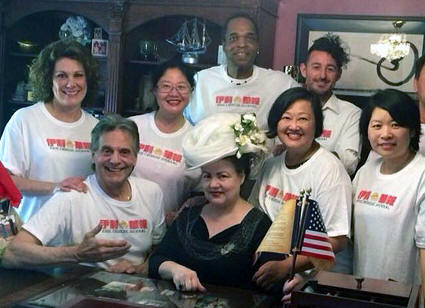|
Over one hundred years after the death of
great American author and humorist Mark Twain (1835-1910) who said
“If voting made any difference, they wouldn’t let us do it,” the
American people are making a concerted effort to have their voices
heard. Yet opinions differ, and one of the greatest points of
contention to be raised during the recent presidential debate
between Donald Trump and Hillary Clinton was whether Donald Trump
opposed the invasion of Iraq before its commencement.

It is first important to understand that the U.S. system is not a
pure democracy, which means that the people elect representatives
who in turn vote on various important matters. Of the 433 members of
the U.S. Congress, 297 voted in favor of the use of military force
against Iraq, 133 voted against the use of military force, and 3 did
not vote. Senator Bernie Sanders, who is no longer in the
presidential race, voted against the use of military force; Hillary
Clinton, who was at that time a senator, voted for the use of
military force. Donald Trump, who was at that time a private
citizen, along with all other U.S. citizens could not vote on the
matter, but each citizen may have held his or her own opinion on the
matter.
As most people now believe that the destabilization of the Middle
East has had enormous negative consequences, it is valid to consider
the early positions of each candidate on this issue as a measure of
foresight and leadership. Hillary Clinton voted for the war, but as
Donald Trump was a private citizen and unable to vote on this
matter, other sources of evidence to provide proof of his opinion
can be gathered, such as his recorded and corroborated conversations
with others.
Some point to his radio conversation with Howard Stern on the first
anniversary of the 9/11 terrorist attacks, in which he responded
“Yeah, I guessssssss so,” to the question “are you for invading
Iraq?” Taken in context that the question was asked on the first
anniversary of the 9/11 terrorist attacks, in fairness, the response
sounded like one which wished to be sensitive to the victims of the
attack as well careful to not be overly critical of the president,
who appeared to be leaning in that direction.
However, in a more serious interview with Neil Cavuto on January
28, 2003,Mr. Trump stated that perhaps we shouldn’t be doing it
(referring to the use of force against Iraq) or perhaps we should
wait for the United Nations. Sean Hannity of Fox News has also
confirmed that he had numerous private conversations in which Mr.
Trump vehemently opposed the Iraq War before it commenced.
It is also important to understand that when the U.S. Congress did
vote on the Iraq War, they were provided with information which for
reasons of national security, were not revealed to the American
people. The American people understand the need for national
security and expect the U.S. Congress to carefully weigh evidence to
which the people are not privy.
It appears, as a private citizen, like many Americans, Mr. Trump
opposed the Iraq War but was respectful of the people who would
actually vote on the matter, knowing they had more information than
that which was available to private citizens.
While many of Mr. Trump’s statements have been controversial, it
appears to be fair to say that indeed he had the vision to foresee
the ill effects which would result from the use of force in Iraq.
.jpg)
克城華人團體組織大家在麗華酒樓集體觀看2016年美國總統大選的第一次公開辯論電視實况轉播 |